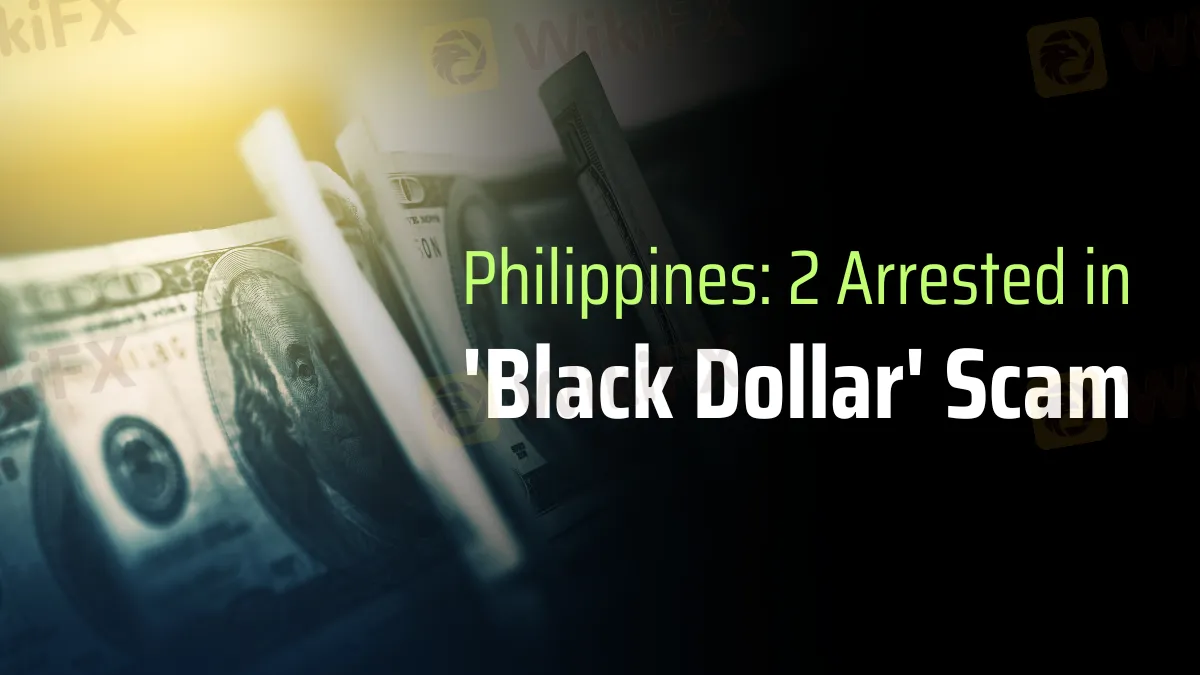简体中文
繁體中文
English
Pусский
日本語
ภาษาไทย
Tiếng Việt
Bahasa Indonesia
Español
हिन्दी
Filippiiniläinen
Français
Deutsch
Português
Türkçe
한국어
العربية
Philippines: 2 Arrested in 'Black Dollar' Scam
Abstract:Two suspected scammers were arrested in the Philippines for a 'black dollar' scam, deceiving victims into buying chemicals to clean and convert counterfeit currency.

The National Bureau of Investigation (NBI) apprehended two suspected fraudsters in accordance with the Revised Penal Code and the Cybercrime Prevention Act. The accused reportedly duped their victims into purchasing chemicals to “clean and convert” counterfeit cash into US dollars.
The fraud included persuading victims that certain chemicals, when appropriately combined, could change counterfeit cash into genuine US dollars. So-called “black dollar” fraudsters in the Philippines have utilized this intricate deception to deceive their naïve victims.
The NBI's Cybercrime Division (NBI-CCD) conducted a sting operation that resulted in the arrest of two African males participating in the “black dollar” scheme. The investigation began on Wednesday in response to a report from a victim who had fallen victim to the fraud.
Arrest Details
The operation began when a complaint was made against a man masquerading as “Dr. Paul.” NBI agents captured Khan Fonkam and his brother Awa Fonkam, both Cameroonians, at Bonifacio Global City (BGC), Taguig, following Director Jaime Santiago's orders.

The Scam Emerges
According to the lawsuit, “Dr. Paul” solicited the victim about investing in the Philippines. They met at a hotel in Makati City on July 5, 2024, and the victim gave them Php400,000 (about $6,844).
“Dr. Paul” then carried out a bogus “decoding process,” which included powdering the money and wrapping counterfeit notes in foil before immersing them in boiling water. He advised the victim not to open the package for 24 hours to enable the chemicals to “work.”
Suspicion and Discovery by the Victim
The victim opened the gift at home, suspicious, to see just black paper inside. When he sought to call “Dr. Paul” for an explanation, he was informed that they couldn't meet and that Php50,000 (about $855) was required for more drugs.
Further inquiry showed that “Dr. Paul” was Khan Fonkam, whom the NBI-CCD had previously captured on May 31, 2024. This finding led the victim to notify police about the deception.
Charges Filed
The accused are currently facing charges at Taguig City Prosecutor's Office. They are accused of estafa (Article 315 of the Revised Penal Code) and unlawful possession and use of counterfeit money (Article 168 of the Revised Penal Code). These accusations are related to Section 6 of Republic Act No. 10175, generally known as the Cybercrime Prevention Act of 2012.
The NBI's quick response in apprehending these fraudsters exemplifies continuous efforts to fight cybercrime and safeguard individuals from deceptive scams. Victims of such scams are advised to report them to authorities so that these misleading tactics might be put a stop to.

Disclaimer:
The views in this article only represent the author's personal views, and do not constitute investment advice on this platform. This platform does not guarantee the accuracy, completeness and timeliness of the information in the article, and will not be liable for any loss caused by the use of or reliance on the information in the article.
Read more

Trump vs. Powell: The Showdown That Will Shape Global Markets
The financial market is in a downturn, with Trump and the Federal Reserve each making their own calculations, while investors anxiously watch from the sidelines. Their decisions will determine the market’s direction!

U.S.-EU Trade War Escalates: What Should Investors Do?
The U.S.-EU trade war has officially begun, with escalating tariffs shaking the markets. Investors face significant challenges—how can they find opportunities amid the turmoil?

Best Binary Options Indicators: Enhance Your Trading Strategy
Binary options trading involves predicting whether an asset's price will rise or fall within a specific timeframe. Unlike traditional investing, more specifically, binary options demand rapid decisions due to fixed expiry times (e.g., 60 seconds to 1 hour). For instance, speculating if EUR/USD will be above 1.0800 in the next five minutes. Success yields a fixed payout, while failure results in the loss of invested capital. Binary indicators distill complex market data—price action, volume, volatility—into actionable signals tailored for short-term trades. Indicators act as a compass, guiding traders to trends, reversals, and optimal entry points, thus enabling traders to detect market shifts for higher-probability decisions.

SEC Charges Ronald A. Pallek in $1.54 Million Fraudulent Investment Scheme
SEC sues Ronald A. Pallek for a $1.54M fraudulent scheme, alleging false promises and Ponzi-like payments to investors.
WikiFX Broker
Latest News
Plunging Oil Prices Spark Market Fears
Celebrate Ramadan 2025 with WelTrade & YAMarkets
WikiFX App Version 3.6.4 Release Announcement
Indian Watchdog Approves Coinbase Registration in India
SILEGX: Is This a New Scammer on the Block?
IIFL Capital Faces SEBI's Regulatory Warning
How Can Fintech Help You Make Money?
Why Is OKX Crypto Exchange Under EU Probe After Bybit $1.5B Heist?
Gold Trading Insights: Prepare for Moves Above $2,900 Post-CPI
Good News for Nigeria's Stock Market: Big Gains for Investors!
Currency Calculator






